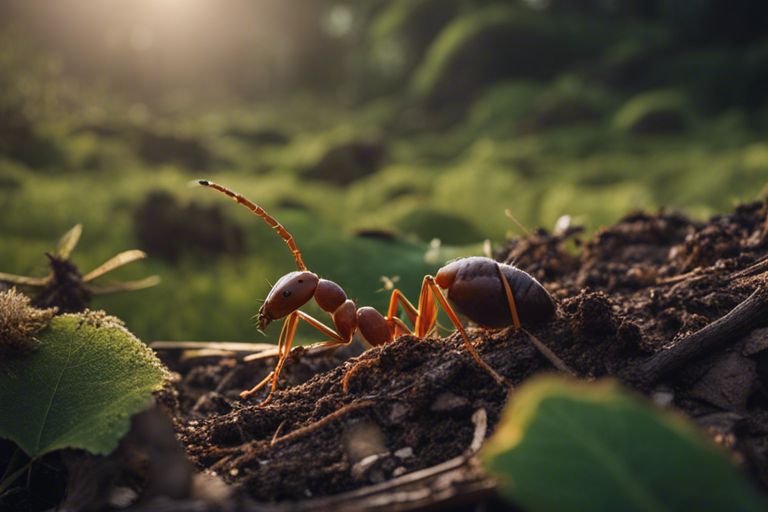Admittedly, the thought of ants becoming extinct may seem inconceivable to some, but the ecological impact of such an event could be catastrophic. As an expert in environmental science, I have spent years studying the delicate balance of ecosystems, and the role of ants in maintaining that balance cannot be overstated. Ants are essential for soil health, plant pollination, and pest control, and their disappearance would likely result in widespread disruption and collapse of numerous ecosystems. In this guide, I will explore the potential implications of ant extinction, from the devastating effects on agriculture to the cascading consequences for other species. Join me as we delve into this thought-provoking and critical topic.
Key Takeaways:
- Disruption of ecosystems: Ants play a crucial role in various ecosystems, and their extinction could lead to a disruption in the balance of these ecosystems.
- Impact on other species: Many other species, such as plants and insects, depend on ants for survival. Their extinction could have cascading effects on these species.
- Changes in soil quality: Ants are important for soil aeration and nutrient cycling. Their extinction could lead to changes in soil quality and fertility.
- Increased competition among species: Without ants, other species may need to compete for resources that were once managed by ants, leading to increased competition and potential overcrowding.
- Importance of conservation: The potential ecological implications of ant extinction highlight the importance of conservation efforts to protect all species, no matter their size or perceived significance.
Ecological Importance of Ants
Before we consider the potential consequences of ant extinction, it’s important to understand the crucial role that ants play in ecosystems. As a highly social and organized species, ants contribute to the balance and diversity of various environments.
Role in Ecosystems
Ants are key players in ecosystems, serving as scavengers, predators, and seed dispersers. Their diverse diet and foraging behaviors make them vital in recycling organic matter and maintaining the health of ecosystems. They also contribute to soil aeration and nutrient cycling, which are essential for plant growth.
Seed Dispersal
Ants play a major role in seed dispersal, particularly in forests. They collect seeds and take them to their nests, where they are protected from herbivores and can germinate in a favorable environment. This process is critical for the regeneration and diversity of plant species, especially in areas with limited resources for seed dispersal.
Pest Control
One lesser-known but crucial role of ants is their contribution to pest control. Many ant species are natural predators of insect pests, helping to keep their populations in check. In agricultural settings, ants can act as a form of biological control, reducing the need for chemical pesticides and promoting a more balanced and sustainable ecosystem.
Potential Impacts of Ant Extinction
Obviously, the extinction of ants would have far-reaching and significant ecological impacts. As a key component of many ecosystems, ants play a crucial role in maintaining the delicate balance of nature. Their extinction would have ripple effects that could be felt throughout entire ecosystems, with potentially devastating consequences for both wildlife and plant life.
Disruption of Food Chains
The extinction of ants would disrupt food chains in many ecosystems. Ants are an important source of food for a wide variety of animals, including birds, small mammals, and other insects. Without ants, these animals would have to find alternative sources of food, potentially leading to increased competition and changes in predator-prey relationships. This disruption could lead to population declines in species that rely on ants as a primary food source, ultimately impacting the overall biodiversity of affected ecosystems.
Effects on Plant Communities
Ants also play a crucial role in maintaining the health and diversity of plant communities. They are known to disperse seeds, aerate the soil, and protect plants from pests and pathogens. Without ants, plants could face increased vulnerability to pest infestations and disease, potentially leading to reduced crop yields and changes in the composition of plant communities. This could have cascading effects on other species that rely on these plants for food and shelter.
Increased Pest Populations
One potential consequence of ant extinction is the proliferation of pest populations. Ants are natural predators of many common garden and agricultural pests, such as aphids and caterpillars. Without ants to keep these populations in check, pest outbreaks could become more frequent and severe, leading to increased crop damage and the need for more intensive pest control measures. This could have negative implications for food security and the health of agricultural ecosystems.
Ways to Prevent Ant Extinction
Now that we understand the potential ecological consequences of ant extinction, it’s crucial to consider ways to prevent it from happening. There are several strategies and actions that can be taken to ensure the preservation of ant populations and their vital role in the ecosystem.
Conservation Efforts
Conservation efforts are essential in protecting ant populations from declining further. This includes creating and maintaining protected areas where ants can thrive without the threat of habitat destruction or pollution. Additionally, research and monitoring programs can help identify at-risk ant species and implement targeted conservation strategies to preserve their populations. By prioritizing the conservation of ants, we can safeguard their crucial role in the environment and prevent the far-reaching consequences of their extinction.
Sustainable Pest Control Methods
Traditional pest control methods can be harmful to ant populations, inadvertently contributing to their decline. By implementing sustainable pest control methods, such as natural predators or non-toxic repellents, we can manage pest populations while minimizing the impact on ants. This approach allows us to address pest issues without causing harm to important ant species, ultimately helping to maintain their populations and ecological contributions.
Habitat Restoration
One of the most effective ways to prevent ant extinction is through habitat restoration. Restoring and preserving natural habitats provides ants with the necessary resources and environments to thrive. This can involve reforestation, wetland restoration, and the creation of pollinator-friendly landscapes. By improving and expanding ant habitats, we can bolster their populations and ensure that they continue to fulfill their critical ecological roles.

Concluding Thoughts
Considering all points discussed, the potential ecological implications of ant extinction are far-reaching and significant. Ants play a crucial role in maintaining the balance of delicate ecosystems around the world, and their absence could lead to cascading effects on plant pollination, pest control, and soil health. It is vital for us to recognize the importance of ants in our environment and to take proactive measures to conserve and protect these valuable insects. As we continue to learn about the intricate connections between species, it becomes increasingly clear that the loss of any one species, even something as small as an ant, can have profound consequences for the health and stability of our natural world.
FAQ
Q: Why are ants important to the ecosystem?
A: Ants play a vital role in the ecosystem as they contribute to soil aeration, seed dispersal, and pest control. They also help recycle dead organisms and nutrients, which enriches the soil and supports plant growth.
Q: What would happen if ants went extinct?
A: If ants were to go extinct, it would have severe ecological implications. The absence of ants could disrupt the natural balance of the ecosystem, leading to a decline in soil health, plant diversity, and pest regulation.
Q: How would ant extinction impact agriculture?
A: Ant extinction could have detrimental effects on agriculture as it would lead to a rise in pests and a decrease in natural pest control. This could result in increased reliance on chemical pest control measures, leading to environmental and economic consequences.
Q: How would ant extinction affect other organisms?
A: Ant extinction could have ripple effects on other organisms that depend on ants for various ecological services, such as seed dispersal and soil maintenance. This could potentially lead to a decline in the populations of certain plant species and animals that rely on ants for survival.
Q: Is it possible for ants to go extinct?
A: While it is unlikely for ants to go completely extinct, some species of ants are facing population declines due to habitat loss, climate change, and human interference. It is essential to recognize the importance of ants in the ecosystem and work towards their conservation.











